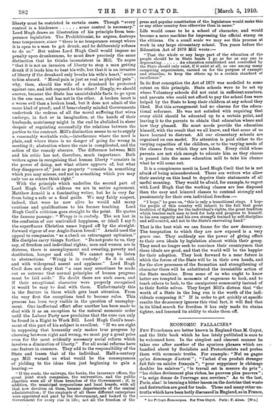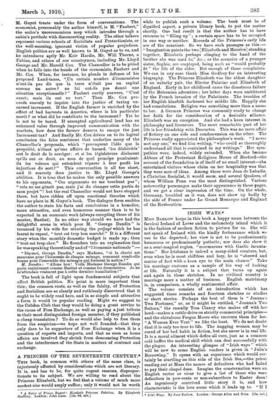ECONOMIC FALLACIES.*
FEW Frenchmen are better known in England than M. Guyot, and the little book which he has lately published is sure to be welcomed here. In the simplest and clearest manner he takes one after another of the spurious phrases which are bandied about by Socialists and Protectionists and probes them with economic truths. For example : "Nul ne gagne qu'au dommage d'autrui " ; " l'achat d'un produit etranger fait fuir tin salaire francais "; "pour supprimer is ch6mage doubler lea salaires "; " le travail eat la mesure du prix " ; " les riches deviennent plus riches, lea pauvres pins pauvres " ; " la neige donne de l'ouvrage aux ouvriers." As to the last, Paris, alas ! is learning a bitter lesson on the doctrine that waste and destruction are good for trade. These and many other un- truths which have been hotly discussed in England, as in France, • L69 Prtfjuges Economiques. Par Yves Guyot. Paris : F. Alma. [60 e..] M. Guyot treats under the form of conversations. The economist, presumably the author himself, is M. "Faubert," the sailor's unceremonious mop which intrudes through a cabin's porthole with disconcerting reality. The other talkers represent various schools of Socialists and Protectionists, or the well-meaning, ignorant victim of popular prejudices. English politics are as well known to M. Guyot as to us, and he introduces aptly Mr. Keir Hardie, Mr. Will Thorne, a Fabian, and others of our countrymen, including Mr. Lloyd George and Mr. Harold Cox. The Chancellor is to be pitied when he falls into the hands of the economists, Faubert and Mr. Cox. When, for instance, be pleads in defence of his proposed Land-taxes, ".Un certain nombre d'economistes n'ont-ils pas dit que la terre n'etait pas un capital .comma un autre ? ne lui ont-ils pas donne une situation exceptionnelle P " Faubert curtly answers, " C'est exact; mais ils ont eu tort." Then Mr. Cox pro- ceeds suavely to inquire into the justice of taxing un- earned increment. If the English farmer is enriched by the effect of bad harvests in America, where is his particular merit ? or what did he contribute to the increment? Yet he is not to be taxed. If exempted agricultural land has an 'enhanced value through improved communication with the markets, how does the farmer deserve to escape the just Increment-tax? And finally Mr. Cox drives on to its logical conclusion the false sentiment that underlies many of the Chancellor's proposals, which " provoquent l'idee que la propriete, n'etant qu'une affaire de hasard, les desherites ' ont le droit de le corriger : et si les leg,islateurs declarent ont ce droit, au nom de quel principe puniraient- ils les voleurs qui entendent reparer h leur profit les injustices du sort?" This conversation is all too short, and it scarcely does justice to Mr. Lloyd George's abilities. It is true that be makes the only possible answers to his opponents, " Ces arguments ne me touchent pas "; " cela ne me genait pas, mais j'ai du changer cette partie de mon projet "! but the real Chancellor would not have stopped there, but have ridden off upon emotional theories which have no place in M. Guyot's book. The dialogue form enables 'the author to state his facts and conclusions in a homelier, more attractive, and even humorous manner than is to be expected in an economic work (always excepting those of his master, Bastiat). In no other way should we have had the delightful scene in which poor M. " George Dandin " is trounced by his wife for uttering the pr4uge which he has learnt to repeat, " tout est trop bon marche." It is a different :story when the monthly domestic budget is made up ; then ."
tout• est trop cher." He flounders into an explanation that he was speaking theoretically and of "reconomie nationale " :—
"Dis-moi, George Dandin," says Madame, "si la cherte est mauvaise pour l'economie de chaque menage, comment serait-elle bonne pour l'ensemble des menages qui forment la nation ? "
M. Dandin: " Allons bon! Will Madame George Dandin qui parle maintenant comme Bastiat et comme les eoonomistes. Je ne m'attendais vraiment pas I cette derniere humiliation !"
The book is full of light upon fundamental subjects that affect British politics. No point is more important than this; the common roots, as well as the falsity, of Protection and Socialism are so clearly and ruthlessly discovered that it ought to be widely read here, and in so simple and attractive a form it would be popular reading. Might we suggest to 'the Cobden Club that they would be doing a great service to the cause of Free Exchange, as well as paying a just tribute to their most distinguished foreign member, if they published a cheap translation ? To do so would also help to free them from the suspicion—we hope not well founded—that they only dare to be supporters of Free Exchange when it is a question of exports and imports, and that as soon as home affairs are involved they shrink from denouncing Protection and the interference of the State in matters of contract and exchange.















































 Previous page
Previous page